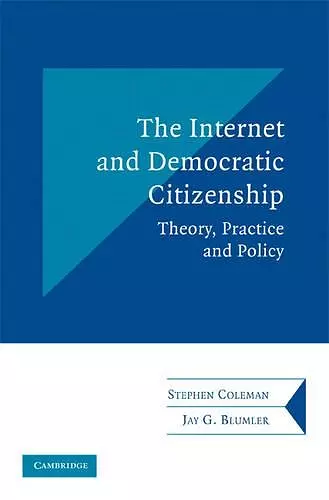The Internet and Democratic Citizenship
Theory, Practice and Policy
Stephen Coleman author Jay G Blumler author
Format:Paperback
Publisher:Cambridge University Press
Published:30th Mar '09
Currently unavailable, and unfortunately no date known when it will be back
This paperback is available in another edition too:
- Hardback£75.00(9780521817523)

This book examines how the Internet can improve public communications and enrich democracy.
Relations between the public and political figures are in a period of flux. New expectations and meanings of citizenship are being entertained and acted upon in combination with an inexorable impoverishment of mainstream political communication. This book argues that the Internet has the potential to improve public communications and enrich democracy.Relations between the public and holders of political authority are in a period of transformative flux. On the one side, new expectations and meanings of citizenship are being entertained and occasionally acted upon. On the other, an inexorable impoverishment of mainstream political communication is taking place. This book argues that the Internet has the potential to improve public communications and enrich democracy, a project that requires imaginative policy-making. This argument is developed through three stages: first exploring the theoretical foundations for renewing democratic citizenship, then examining practical case studies of e-democracy, and finally, reviewing the limitations of recent policies designed to promote e-democracy and setting out a radical, but practical proposal for an online civic commons: a trusted public space where the dispersed energies, self-articulations and aspirations of citizens can be rehearsed, in public, within a process of ongoing feedback to the various levels and centers of governance: local, national and transnational.
'The potential for the Internet to support democracy is substantial, but as yet unrealized. The authors - two world-leading scholars of political communication - provide a penetrating synthesis of theory and research to explain the limitation of contemporary approaches to using the Internet and related media to enhance the communicative power of citizens. Their analysis leads to a bold prescription for creating a new civic commons 2.0 that will enable 'more deliberative democracy'. This is an excellent scholarly book that will stimulate and inform public debate in a vital area of communication research. It is must reading not only for students of the iternet, but also for anyone interested in the vitality of democratic institutions and processes.' William H. Dutton, Director, Oxford Internet Institute, University of Oxford
'A refreshingly new and exciting conceptualization of Democratic Citizenship and the potential of the Internet as a public sphere. Coleman and Blumler have written an inspiring, not-to-be-missed book that provides clear and sensible guidelines for creating a Civic Commons in cyberspace.' Doris A. Graber, University of Illinois at Chicago
'In this authoritative review of current practice and debates in e-democracy Stephen Coleman and Jay Blumer combine a powerful theoretical frame work with a hard-headed analysis of what works and what doesn't. Carefully avoiding technological determinism, they argue convincingly that the 'vulnerable potential' of the internet as a democratic tool will only be fulfilled through the establishment of an independent agency to develop, promote and oversee online deliberation.' Matthew Taylor, Chief Executive, Royal Society for the Encouragement of the Arts
ISBN: 9780521520782
Dimensions: 229mm x 152mm x 13mm
Weight: 350g
232 pages